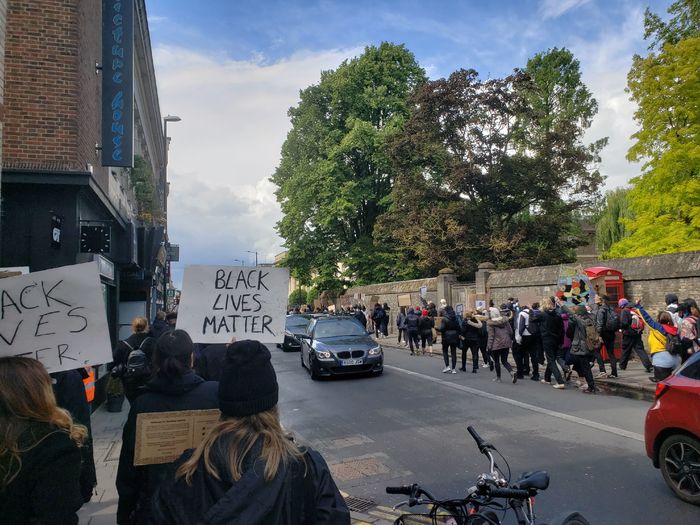Cambridge students launch website for personalised emails supporting Black Lives Matter
The website takes a user’s name and address to create personalised emails addressed to their local MP to express concerns about various racial issues

Following the death of George Floyd, some concerned Britons have written to their local MPs to ask that the UK apply political pressure and halt the sale of policing equipment, including tear gas, to the US. A group of students from Cambridge and beyond hope to streamline this with their new website ’Write for Change’.
By typing only their postcode and name, users can generate a series of emails demanding action on issues relating to the Black Lives Matter (BLM) campaign. These emails include the user’s name, address and their MP’s name, which can then be easily sent through a variety of email services.
The website, along with offering a template demanding MPs suspend the exportation of policing equipment to the US, tackles other issues relating to the BLM campaign. Two of these emails –, one addressed to MPs and the other to the CEO of Govia Thameslink Railway – demand justice for Belly Mujinga, a railway worker who died of Covid-19 after being spat on at work by a man claiming to have the disease.
Another email template demands justice for Shukri Abdi, a 12-year-old girl who was found dead in Manchester’s River Irwell. Abdi’s family accuse police of institutional racism in failing to conduct a full investigation.
The deaths of Mujinga and Abdi have become a focal point for BLM protestors in the UK, who allege that their deaths, along with the investigations around them, highlight racial inequalities in the UK.
The Write for Change website encourages users to add their own personal touch to emails to increase the likelihood that the email will avoid spam filters and that MPs will respond. David Swarbrick, one of the website’s developers and an Engineering student at Churchill, explains: “some MPs do filter their emails to remove ones that seem to be repetitions (and thus could be spam). We’re looking into ways to get around this that include some randomisation/automatic generation of the templates so that the emails sent are not identical”.
The idea was initially thought up by Puria Radmard, an Engineering student at Trinity, who put out a call for help building the project. Behrad Koohy, one of the developers and a Computer Science student at the University of Southampton, explained the informal nature of the creation process: “We hopped on a call and programmed together […] We’re completely self-funded, using the credits that we get for free as students.”
It took the team one day to create the website. Radmard comments: “I am seriously impressed by how quickly the team has been able to put this together”.
Despite the apparent success of the website, with over 1500 visitors so far, Radmard says the website “was treated by the team as a ‘version 1’ of more to come”. The developers hope to expand it to other causes outside of BLM in the future, and add a feature that “allows users to submit their own templates and get a link which they can share to other people” according to Koohy.
Radmard says: “Hopefully with this web app, circulating long lists of emails will be easier and quicker, and people can show their support and put weight behind causes in much less time. With this, the bar for social activism can be put a little bit lower.”
Swarbrick added: “Democracy cannot be representative unless our representatives are aware of the issues we care about and wish to see tackled”.
If you have been affected by any of the issues raised in this article, the following information and support is available:
- Mind: A mental health charity providing free online resources.
- Samaritans: A 24-hour mental health helpline.
- The Black, African and Asian Therapy Network: A list of free services available across the UK.
- Ways To Help: A collection of resources, including petitions and bail funds, compiled by Black Lives Matter.
- Learn To Be An Active Bystander: Learn how best to challenge antisocial and discriminatory behaviour on campus.
- CamQuaranchats Podcast: The most recent episode of the CamQuaranchats podcast where students talked about their experiences of institutional racism at Cambridge.
 News / CUP announces funding scheme for under-represented academics19 December 2025
News / CUP announces funding scheme for under-represented academics19 December 2025 News / SU reluctantly registers controversial women’s soc18 December 2025
News / SU reluctantly registers controversial women’s soc18 December 2025 News / Cambridge welcomes UK rejoining the Erasmus scheme20 December 2025
News / Cambridge welcomes UK rejoining the Erasmus scheme20 December 2025 Features / Should I stay or should I go? Cambridge students and alumni reflect on how their memories stay with them15 December 2025
Features / Should I stay or should I go? Cambridge students and alumni reflect on how their memories stay with them15 December 2025 Film & TV / Timothée Chalamet and the era-fication of film marketing21 December 2025
Film & TV / Timothée Chalamet and the era-fication of film marketing21 December 2025










